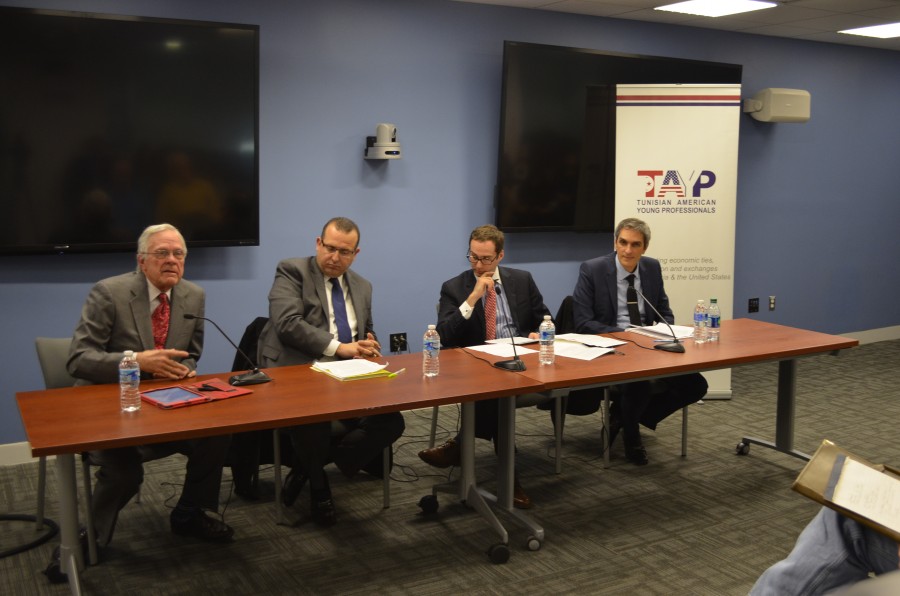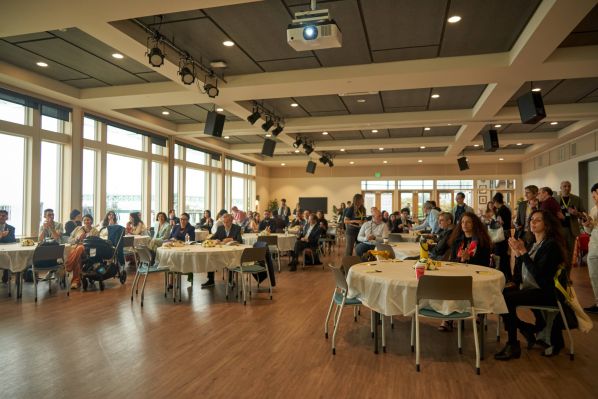Investment, Entrepreneurship, and Development in Tunisia Conference Review

On Monday March 16, TAYP, the American Tunisian Association, and The George Washington University hosted a panel of high-profile speakers to follow up on the March 5th visit of Secretary of Commerce Penny Pritzker to Tunisia. This conference allowed high-profile speakers to highlight some of the biggest challenges currently facing Tunisia’s economic development and what they believe could help alleviate the financial pressures the country is facing. At a time when high unemployment rates remain stagnant, domestic investment remains risk-averse, and the government faces a fiscal crisis, it is clear that immediate reform is imperative to ensure Tunisia’s future stability.
Present at the talk were Bowman Cutter, the Chairman of the Board of the Tunisian American Enterprise Fund; Amine Mati, the International Monetary Fund chief for Tunisia; Scott Handler, the Special Adviser to US Secretary of Commerce Penny Pritzker; and Mohamed Malouche, the Chairman of the Board of the Tunisian American Young Professionals. Also in attendance was Kais Darragi, the Charge d’Affaires at the Tunisian Embassy in Washington DC, who also gave introductory remarks.
All conference speakers recognized that this is a critical moment in Tunisia’s history and that the time to enact positive, sustainable change is now. According to Mr. Cutter, Tunisia is in a strong position because of its dynamic civil society, high status of women, and good governing structure. Despite these gains, all of the speakers agreed that there were worrisome underlying issues that have become entrenched in the Tunisian economy and limit growth.
Many of the challenges discussed were on the macro-level and added to Tunisia’s low-growth trap. One of the biggest noted challenges was a cumbersome investment code that does not prize innovation, is highly risk averse, and is not accessible to small and medium enterprises. In addition many of the speakers noted that by eliminating red tape, strengthening the current arbitrary banking and taxation laws, supporting risk taking in the financial market, and making the current business environment, the government could make the Tunisia a more attractive and better functioning financial hub.
Another major sticking point that the speakers agreed on was that currently, development is state-led, not driven by the private sector. This has exacerbated the trend of ineffective public spending and government investment. While the government has put significant funds toward regional and interior growth, there have been little gain and the appropriate beneficiaries have not reaped the rewards of these spending initiatives.
After addressing some of the major systemic fiscal challenges, the speakers discussed some of the next steps that should be taken. Mr. Handler reiterated the need for stronger public-private partnerships that play to both sectors’ strengths and can lead to more effective decision-making and financial activity.
Mr. Malouche saw a dialogue as one way the government could create a cohesive message and plan of activity to address economic reform. During Tunisia’s political transition, dialogues helped map out a corrective course of action and played a significant role in the creation of the constitution and the 2014 elections. He referenced US President Franklin D. Roosevelt’s 100 Days of Legislation during his first few months in office at the height of the Great Depression as inspiration. With this model, the government can map out legislative reforms that address short and long-term needs, and have a strong strategy moving forward.
This conference was a great opportunity for high-level analysis of Tunisia’s economic future and prospects for success. This conference reinforced that Tunisia has the capacity to become a strong economic hub, with corrective actions and reforms that address the constraints of the current system. With greater direction and clarity, and a better-defined economic vision, Tunisia can facilitate greater confidence in its market, inspire more entrepreneurs to get involved in the formal economy, and become not just a political model, but also an economic one, for the rest of the Middle East and North Africa.
related news




About the author
Courtney Joline